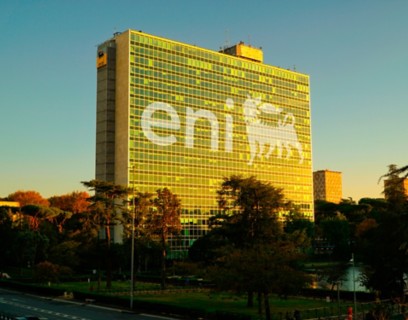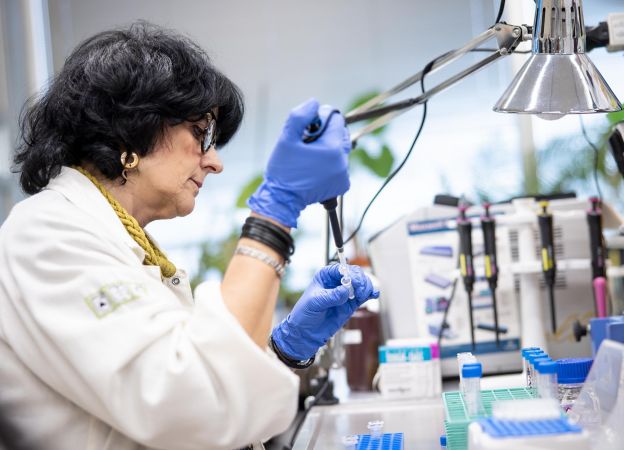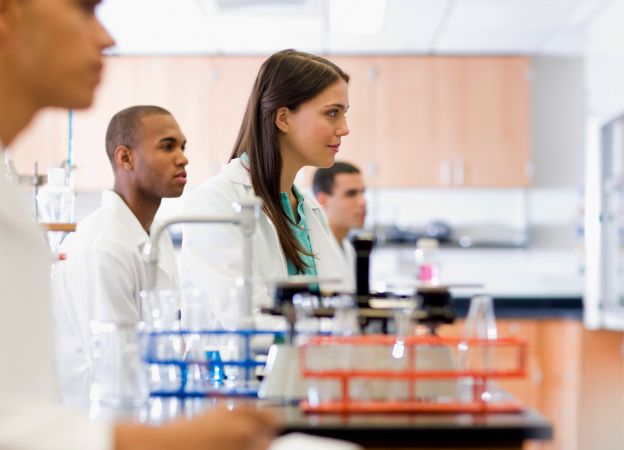Eni Award: our prize for energy and environmental science
An international award for research and technological innovation in the energy and environmental fields.

Innovation and scientific research for the future of energy
Since its first edition in 2008, the Eni Award has become a world benchmark in innovation and scientific research. Over the years, the award has evolved with the aim of developing a better use of energy sources, promoting science and technology applied to the environment and encouraging the new generations of researchers.
Since 2017, it has opened up to Africa's scientific talent and has included awards to research on sustainability and access to energy, in line with the United Nations’ Sustainable Development Goals. The Eni Award also includes a section for the best PhD theses and prizes for technological innovations developed by Eni researchers and technicians.
Today, the Eni Award has established itself as a world-class event involving the most important scientific institutions as well as Eni's research centres.
The 2026 Eni Awards - Official announcements
Again in 2026, Eni Awards will provide: three main prizes for Advanced Environmental Solutions, Energy Transition and Energy Frontiers; awards for the Young Researcher of the Year and for Young Talents from Africa; “Eni for Innovation” Recognitions for our researchers.
Deadline for applications was November 14th, 2025 (only for “Eni for Innovation” Recognitions the deadline is January 31st, 2026).
See the Official announcements
For any information please contact the Scientific Secretariat: eniaward@feem.it


Eni Award: browse the interactive special report
Explore winners, award categories, and sustainable development goals.

A distinguished jury
The Award’s Scientific Commission that assesses candidates and awards prizes is made up of scientists from top global research institutions. It currently includes Prof. Jean-Marie Lehn, winner of the Nobel prize in Chemistry in 1987, and Prof. Moungi Bawendi, winner of the Nobel prize in Chemistry in 2023. The late Robert Richardson, winner of the Nobel prize in Physics in 1996 and the late Sir Harold Kroto, winner of the Nobel prize in Chemistry in 1996, were former members.
The Eni Award 2025 ceremony
The award ceremony for the seventeenth edition of the Eni Award was held on 8 October 2025 at the Quirinal Palace in Rome in the presence of the President of the Republic, Sergio Mattarella, the Chairman of Eni’s Board of Directors, Giuseppe Zafarana, and Eni’s CEO Claudio Descalzi.
The participation of Italy’s highest authority confirms the significance of an increasingly important award for both Eni and the scientific community.
The winners of the 2025 edition
Discover all the awards and recognitions.
Advanced Environmental Solutions Award
Development of a sustainable and resilient nature through the enhancement of nature-based solutions, and the preservation and restoration of natural capital, in order to accelerate the transition towards environmentally sustainable business models, accordingly with the “One Planet - One Health” perspective.
The winner of the 2025 edition
Philippe Ciais
Understanding carbon uptake by terrestrial ecosystems to mitigate climate change
Laboratoire des Sciences du Climat et de l’Environnement (France)
Energy Transition Award
Solutions and technologies for sustainable and affordable energy production, for just and fair access to energy and for the capture, utilization and sequestration of carbon dioxide.
The winner of the 2025 edition
Jeff Dahn
The importance of long lifetime lithium-ion batteries for the Energy Transition to Global Electrification
Dalhousie University (Canada)
Energy Frontiers Award
Disruptive ideas in the field of new energy sources, renewable energies and related processes aimed to change the energy paradigm of the future and to achieve the decarbonization of the energy systems.
The winner of the 2025 edition
Lydéric Bocquet
Unleashing the power of osmotic energy
Ecole Normale Supérieure (France)
Young Researcher of the Year Awards
Two awards for graduates with PhD theses from Italian universities related to energy and environment, aimed to foster a net-zero carbon future, decarbonizing the energy system, preserving natural capital and promoting an efficient and sustainable access to energy, according to SDGs.
The winners of the 2025 edition
Maria Basso
Solution-based oxide films for clean energy applications
Università degli Studi di Padova
Virginia Venezia
Multifunctional hybrid materials from biowaste valorization
Università degli Studi di Napoli “Federico II”
Young Talents from Africa
Two awards for African researchers, enrolled in a PhD course in African Universities, to support their research and innovative ideas on topics related to energy and environment.
The winners of the 2025 edition
Asengo Gerardin Mabia
Synthesis of Polylactic Acid (PLA) from Sugarcane Molasses using Cocoa Husks as Enzyme Immobilization Support
Institut National Polytechnique Félix Houphouët-Boigny INPHB (Ivory Coast)
Shimaa Farag
Tailored enzymatic based treatment of wastewater to detoxify heavy metals and degrade antibiotics
The American University in Cairo (Egypt)
Eni for Innovation (for Eni employees)
Three awards for the best: patented solution, technological innovation and innovative digital and information technology solution by Eni group people.
The winners of the 2025 edition
Autonomous Detection and Characterization of Underwater Discharges: Enhancing Robotic Platforms with Intelligent Acoustic Vision for Sustainable Industrial Offshore Operations
Simone Ambrosini, Michele Gerolin, Tiberio Grasso, Luigi Miozza, Alberto Moro, Andrea Vignali (Eni and EniProgetti)
Integrated process for production of high-performance bio-gasoline fuels
Antonio Amico, Andrea Amoroso, Corrado Fittavolini, Francesca Guarnieri, Alberto Landoni, Nicoletta Panariti, Francesco Ricci (Eni)
An innovative Multi Energy Systems design and Optimization tool (MESOpt) for evaluating decarbonization opportunities
Alfonso Amendola, Tommaso Audino, Mario Di Marco, Giammarco Gioco, Mario Primato, Simone Sala (Eni and Plenitude), Emanuele Martelli (Politecnico di Milano)
The special mention "Eni Joule for Entrepreneurship award", the new prize to innovative and sustainable entrepreneurship
We also continue to promote the development of an ecosystem of sustainable innovation aligned with Eni’s mission through the Eni Joule for Entrepreneurship award, a prize we have established through Joule our business school, which complements the Eni Award in fostering the implementation, enhancement and transfer of technologies in the field of energy transition. The award aims to promote innovative and sustainable entrepreneurship in the field of decarbonization of processes and products, circular economy, and the fight against climate change, in order to contribute to Italy's social and economic development.
The winners of the 2025 edition
The special mention “Eni Joule for Entrepreneurship” was awarded to the teams:
- Exe Engineering for Environment that has developed a proprietary hardware and software solution to automate and optimize the capture of biogas from landfills.
- Koalisation Benefit Corporation that works in the carbon finance sector by implementing high-impact projects based on the social development of indigenous communities and the regeneration of environmental ecosystems.
- Eoliann Benefit Corporation that has developed a platform for assessing and quantifying physical risks related to climate change, such as floods, droughts, heat waves and extreme rainfall, to support the proactive management of such risks from a data-driven perspective.
The winners of the 2025 edition
Discover all the awards and recognitions.
Advanced Environmental Solutions
Advanced Environmental Solutions Award
Development of a sustainable and resilient nature through the enhancement of nature-based solutions, and the preservation and restoration of natural capital, in order to accelerate the transition towards environmentally sustainable business models, accordingly with the “One Planet - One Health” perspective.
The winner of the 2025 edition
Philippe Ciais
Understanding carbon uptake by terrestrial ecosystems to mitigate climate change
Laboratoire des Sciences du Climat et de l’Environnement (France)
Energy Transition
Energy Transition Award
Solutions and technologies for sustainable and affordable energy production, for just and fair access to energy and for the capture, utilization and sequestration of carbon dioxide.
The winner of the 2025 edition
Jeff Dahn
The importance of long lifetime lithium-ion batteries for the Energy Transition to Global Electrification
Dalhousie University (Canada)
Energy Frontiers
Energy Frontiers Award
Disruptive ideas in the field of new energy sources, renewable energies and related processes aimed to change the energy paradigm of the future and to achieve the decarbonization of the energy systems.
The winner of the 2025 edition
Lydéric Bocquet
Unleashing the power of osmotic energy
Ecole Normale Supérieure (France)
Young Researcher of the Year
Young Researcher of the Year Awards
Two awards for graduates with PhD theses from Italian universities related to energy and environment, aimed to foster a net-zero carbon future, decarbonizing the energy system, preserving natural capital and promoting an efficient and sustainable access to energy, according to SDGs.
The winners of the 2025 edition
Maria Basso
Solution-based oxide films for clean energy applications
Università degli Studi di Padova
Virginia Venezia
Multifunctional hybrid materials from biowaste valorization
Università degli Studi di Napoli “Federico II”
Young Talents from Africa
Young Talents from Africa
Two awards for African researchers, enrolled in a PhD course in African Universities, to support their research and innovative ideas on topics related to energy and environment.
The winners of the 2025 edition
Asengo Gerardin Mabia
Synthesis of Polylactic Acid (PLA) from Sugarcane Molasses using Cocoa Husks as Enzyme Immobilization Support
Institut National Polytechnique Félix Houphouët-Boigny INPHB (Ivory Coast)
Shimaa Farag
Tailored enzymatic based treatment of wastewater to detoxify heavy metals and degrade antibiotics
The American University in Cairo (Egypt)
Eni for Innovation (for Eni employees)
Eni for Innovation (for Eni employees)
Three awards for the best: patented solution, technological innovation and innovative digital and information technology solution by Eni group people.
The winners of the 2025 edition
Autonomous Detection and Characterization of Underwater Discharges: Enhancing Robotic Platforms with Intelligent Acoustic Vision for Sustainable Industrial Offshore Operations
Simone Ambrosini, Michele Gerolin, Tiberio Grasso, Luigi Miozza, Alberto Moro, Andrea Vignali (Eni and EniProgetti)
Integrated process for production of high-performance bio-gasoline fuels
Antonio Amico, Andrea Amoroso, Corrado Fittavolini, Francesca Guarnieri, Alberto Landoni, Nicoletta Panariti, Francesco Ricci (Eni)
An innovative Multi Energy Systems design and Optimization tool (MESOpt) for evaluating decarbonization opportunities
Alfonso Amendola, Tommaso Audino, Mario Di Marco, Giammarco Gioco, Mario Primato, Simone Sala (Eni and Plenitude), Emanuele Martelli (Politecnico di Milano)
Eni Joule for Entrepreneurship
The special mention "Eni Joule for Entrepreneurship award", the new prize to innovative and sustainable entrepreneurship
We also continue to promote the development of an ecosystem of sustainable innovation aligned with Eni’s mission through the Eni Joule for Entrepreneurship award, a prize we have established through Joule our business school, which complements the Eni Award in fostering the implementation, enhancement and transfer of technologies in the field of energy transition. The award aims to promote innovative and sustainable entrepreneurship in the field of decarbonization of processes and products, circular economy, and the fight against climate change, in order to contribute to Italy's social and economic development.
The winners of the 2025 edition
The special mention “Eni Joule for Entrepreneurship” was awarded to the teams:
- Exe Engineering for Environment that has developed a proprietary hardware and software solution to automate and optimize the capture of biogas from landfills.
- Koalisation Benefit Corporation that works in the carbon finance sector by implementing high-impact projects based on the social development of indigenous communities and the regeneration of environmental ecosystems.
- Eoliann Benefit Corporation that has developed a platform for assessing and quantifying physical risks related to climate change, such as floods, droughts, heat waves and extreme rainfall, to support the proactive management of such risks from a data-driven perspective.












































